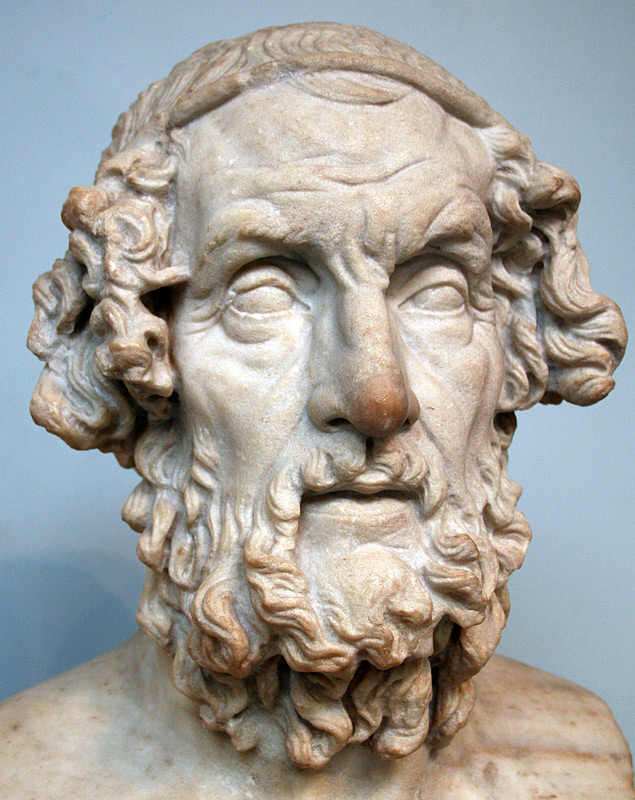‘Here the earth covers the sacred head, adorner of warrior heroes, divine Homer.’
– 36, Life of Homer, Pseudo-Herodotus.
Welcome to the second instalment of our weekly blog. It’s been an exciting week for us; we’ve announced our Edinburgh Fringe shows (we’ll be on at Assembly Roxy between 6th and 19th August) and had a cracking day of rehearsals – we’ll be posting some photos shortly! Of course we’ve also been plotting our next blog post – this time we thought we’d do a bit of a crash-course about the poet behind the Battle of Frogs and Mice, Homer.

He’s a bit of an enigmatic figure. The dominant view for a long time was that of a single genius poet in the 7th/8th century BC who composed a number of poems such as the Iliad and Odyssey, and learnt its thousands of lines off by heart. Ancient historians (such as the above-quoted Pseudo-Herodotus) describe him as a blind bard, once a shepherd, travelling and performing parts of the work from memory all across Ancient Greece. They use this to explain many of the features of the two poems: their pan-Grecian outlook, their agrarian similes, their own interest in storytelling.
However, in the last two centuries predominantly, a debate has raged about Homer’s very existence, a debate called the Homeric Question. It throws into doubt not only his authorship of the two epics but also the form of the poems themselves.
Using the ground-breaking work of Milman Parry and Albert Lord (pictured above) in the 1930s , the Homeric Question suggests that the poems were not simply the creation of a single individual but instead part of a centuries old tradition of oral poetry. This tradition saw travelling bards learning formulaic components (phrases, similes, epithets) and metrical tricks to live-compose their own versions of the Epic Cycle’s stories on the fly, rather than learning the thousands of lines off by heart.
The authors of the Iliad and Odyssey (for there is considerable evidence that they are two completely different poets) may have simply been bards of this oral poetic tradition who transcribed their versions. As such, the name ‘Homer’ has become something of a catch-all for these transcribed oral poems, of which The Battle of Frogs and Mice is one.
Of course, as discussions of Homeric authorship have been going on for literally millennia, there are plenty of other theories and plenty more to the two we’ve talked about here. But you know what that means – more fodder for future blog posts! Keep an eye out in the coming weeks for some more info on the oral poetic tradition; how it relates to The Battle of Frogs and Mice; and about Milman Parry himself (after-all, he is our absolute favourite classicist – hey, everyone’s got one!).
Until then, we hope you’re getting ready to sound the war-croak with us at our scratch night show on 18th June at The Cockpit’s Theatre in the Pound!


